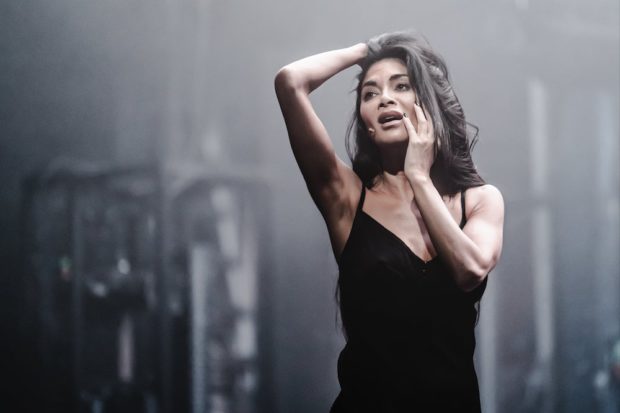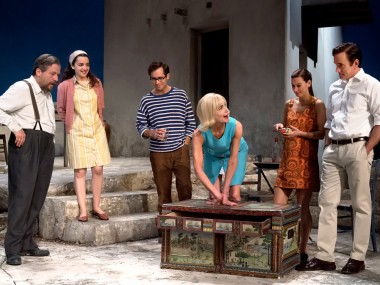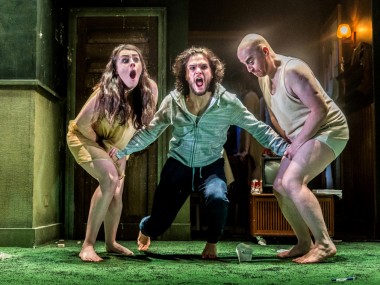Sunset Boulevard, Savoy Theatre
Wednesday 13th December 2023

Is Jamie Lloyd the best director in British theatre? It is hard to deny this accolade after stepping out of his current sell-out production of Andrew Lloyd Webber’s 1993 musical, Sunset Boulevard, aka Sunset Blvd., Nerves tingling, vision blurred, ears ringing, mind expanded, emotions shredded. It feels like it’s not so much a revival as a reinvention, dazzling us with imaginative theatricality and a powerful zap of pure electric energy. Yeah, it really is that good. Starring former Pussycat Doll Nicole Scherzinger as Norma Desmond, this is an evening of sheer pleasurable excess: bold singing, thrilling dance, immersive music, superb projections and great storytelling. It almost leaves you speechless. But not quite.
The immediate feeling is that the show doesn’t require a review, but simply to be adored: an ear-splitting torch song. But on reflection, singing isn’t my strong point, so here goes:
Based on Billy Wilder’s 1950 film noir about struggling screenwriter Joe Gillis and his relationship with faded Hollywood star of the silent screen, Norma Desmond, who lives on Sunset Boulevard with Max, her minder, the book — by Don Black and Christopher Hampton — recycles the best lines of the screenplay, including exchanges like this one:
Joe: “You’re Norma Desmond. You used to be in silent pictures. You used to be big.”
Norma: “I am big. It’s the pictures that got small.”
And of course, “You see, this is my life! It always will be! Nothing else! Just us, and the cameras, and those wonderful people out there in the dark!… All right, Mister DeMille, I’m ready for my close-up.”
The tensions between the rich Norma, who wants Joe to work on her plodding screenplay of Salome, the film that will signal her return to stardom and its legions of fans, and Joe’s own desire for money, is paralleled by a subplot involving Betty Schaefer, another writer waiting for her big break, and her complicated feelings for Joe and for her fiancé Artie. The tragedy of the story is that Norma cannot face reality and becomes increasingly jealous and increasingly deluded, while Joe is likewise unable to love anything but fame and money. The casualties of Hollywood’s fierce Darwinianism are not only Norma and Joe, but also Betty.
The main relationship of Norma (older rich woman) and Joe (impoverished younger man) is one of codependency, with the woman having most of the power. But although Norma has wealth, she is also isolated and shielded by Max from the reality that her 3 million fans from yesteryear have forgotten her. The scene when she returns to the studio after decades away, under the mistaken belief that she has been invited to talk to Cecil B DeMille, is emotionally devastating. And her anger when she feels betrayed is dangerous, fatal — she may be older, but she is still fatale. And as Joe becomes a kept man, he begins to enjoy the material comforts of a rich lifestyle, compromising his feelings in the same way that, as Betty points out, he has compromised his screenwriting skills.
For me, the emotional core of the story is the theme of star and fan. Like DeMille and Max, Norma has been part of the pioneering generation of Hollywood movie-makers and her songs, “With One Look”,“New Ways To Dream” and “As If We Never Said Goodbye” explore the complex feelings of the star, who depends on the adoration of the fan for self-validation and power. In the theatre as in the cinema, we are the audience, “all you wonderful people, out there in the dark.” The star need us as much as we need the star to be our image of beauty and success. Bigger than life. Better than life. By contrast, Joe’s title song, “Sunset Boulevard” really nails both the cynicism of the outsider and the allure of place: the Los Angeles street exerts a fatal magnetism.
Lloyd’s production takes the monochrome palette of silent film, with occasional glimpses of Expressionistically elongated shadows, making a kind of tribute to the 1950 film. Designer Soutra Gilmour conjures up a world of black and grey tones, mixing in a more contemporary LA look of T-shirt and sportswear. But Lloyd’s best move is to integrate the stage action with the process of film-making: he has handheld camera crews on stage shooting the singing and talking, with live close-ups projected onto a huge screen. These massive faces are visually stunning, at once overpoweringly gigantic and oddly intimate — every skin blemish is visible. At various moments, the close ups are superimposed — young Norma with older Norma for example — resulting in the multiplication of meaning.
As well as these effects, the creation of a film world on the stage includes projected credits that appear at the start of the show, studio spot lights and dance sequences. So pervasive is this monochrome universe that when Lloyd suddenly changes the colour to red it has a real, and shocking, dramatic effect. But perhaps the most thrilling sequence in an evening which piles stimulation on stimulation is Joe’s singing of the title song, which involves the camera following the character around the dressing rooms backstage, with a nod to a photo of The Pussycat Dolls in Scherzinger’s room, down several stairwells, passing a cutout of the composer, before Joe emerges into the open air and sings another verse on the street outside. He then comes rushing back through the stalls to the stage. Wow. This is an absolutely audacious sequence — sheer excess.
Scherzinger’s celebrity status gives a meta-theatrical twist to Norma, who has lost her own celebrity. Barefoot in a black slip, she belts out the big numbers with an awesome power that smashes the eardrums and gives the story a centre of histrionic hysteria. It’s stunning. Lloyd often leaves her alone on stage, sometimes writhing on the floor in Fabian Aloise’s choreography, which works best in the ensemble numbers when the music turns jazzy and takes a break from bombast. Scherzinger’s operatic belt outs win audience claps, but some of the softer passages work just as well, and her tyrannically monstrous persona finds room for humour, vulnerability and sadness too. This physically, emotionally exposing performance contrasts with Tom Francis’s Joe, who is more constrained, but sings with wonderful precision.
Andrew Lloyd Webber’s composition has all the sweep of film music, with its rich orchestration and overt romanticism, although while I’m happy to be swept up in it, I couldn’t quite ignore its repetitiveness and its sheer schmaltz. Still, I really like Grace Hodgett Young’s attractively clear and sweet soprano for Betty, and David Thaxton’s excellent performance as the brooding Max. Young Norma, played by Hannah Yun Chamberlain, likewise does not put a foot wrong. But the star remains Scherzinger, playing a gothic incarnation of narcissistic monstrosity, wholly committed to the role. Her stage presence has rizz, to use the word of the year, and this stupendous production feels like total theatre for the Instagram age, a really radical and triumphant reimagining of the musical: nothing succeeds like excess.
And if, as Norma’s achingly beautiful song says, Hollywood gave us “new ways to dream”, so Jamie Lloyd’s directing has refashioned the theatre as a place to dream again afresh.
© Aleks Sierz



